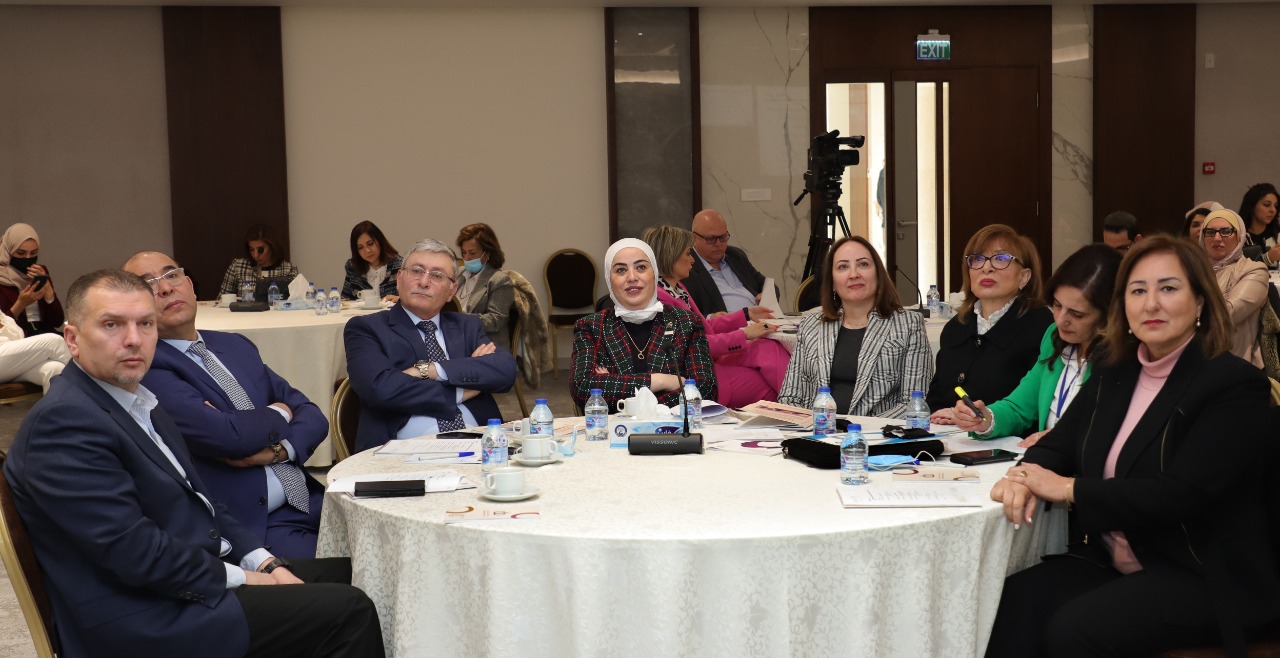
The Association of Women in Decision-Making Positions in cooperation with the Association of Banks in Jordan and the International Labor Organization organized a ceremony to launch the outputs of the project “New Directions to Advance the Numbers of Jordanian Women on Boards of Directors in Listed Companies Focusing on the Banking Sector” under the patronage of Her Excellency the Minister of State for Legal Affairs Ms. Wafaa Bani Mustafa and in presence of Deputy Governor of the Central Bank, His Excellency Mr. Ziad Ghanma, a number of bank managers, a group of administrators and those in charge of banking and financial sectors, a number of general secretaries of the relevant ministries and representatives of civil society.
The ceremony took place at the headquarters of the Association of Banks on Tuesday, March 15, 2022, which came to launch the outputs of the project “New Directions to Advance the Numbers of Jordanian Women on Boards of Directors in Listed Companies Focusing on the Banking Sector” implemented by the Association for Women in Decision-Making Positions and funded by Decent Work for Women Program of the International Labor Organization, UN Women and the Swedish Government.
Ms. Wafaa Bani Mustafa called during the ceremony to work to support efforts seeking to achieve gender equality, and she highlighted the challenges women face within the work sectors and how to work towards developing their administrative and functional skills so that they, in turn, can progress towards senior positions.
Then the project manager, Dima Barakat, the secretary of the association lawyer Rania Wehbe, and Dr. Wafaa Abu Samra, the treasurer, reviewed the project’s most important axes and output. It was found that 14 women are on banks boards of directors out of a total of 173 members which indicates the low rate of Women in banks senior management and financial institutions.
The project’s key objectives were clarified, solutions and recommendations were highlighted, constructive dialogue with institutions was supported and a serious work mechanism was discussed to bring Jordanian women to senior management within a clear legal framework. It is worth noting that the association through the project “New Directions in Advancing the Number of Jordanian Women on the Boards of Directors of Listed Companies,” seeks to achieve an increase of 3 – 5% in the number of trained and ready women to join the boards of directors in the Jordanian banking sectors. The association endeavors to amend the regulating legislation of companies and banks to achieve a 30% increase. The project’s steps were also presented in addition to the trainings and workshops that were developed for the leadership qualification of female employees for later participation in the advanced course for the qualification of board of directors.
The names of the trainees nominated for the advanced training program (accredited board member) implemented in cooperation with the Jordanian Governance House and the International Finance Corporation were announced. The trainees are four women who held senior positions in the banks participating in the project as well as women who held senior positions.
Mrs. Reem Badran as a former board member of several banks also reviewed the major obstacles and challenges urging to continue supporting efforts seeking to advance women’s role in management. Ms. Deema Aqel touched upon the challenges she faced as Executive Vice President of Al-Itihad Bank and Board of Directors member of Safwa Islamic Bank.
The ceremony included a dialogue session moderated by lawyer Lynn Al-Khayat, in which Ms. Reem Badran, member of the board of directors of several companies, Ms. Dima Akl, Executive Vice President at Bank Al Etihad, Dr. Adnan Al-Araj, General Manager of BLOM Bank, and Ms. Reem Aslan, Director of the Decent Work Program for Women at the International Labor Organization, participated. Dr. Adnan Al-Araj confirmed that the percentage of women’s participation in the boards of directors of banks in Jordan is good compared with many countries in the region, and this percentage increases clearly if it is calculated at the level of independent board members stressing the need to change the mindset of society to empower women by developing their competencies so that their participation has an added value. He added that the banking sector in Jordan enjoys high women contribution, and the percentage of females in banks reaches more than 33%, and in some banks 40%. Women work at all administrative levels without exception.
Ms. Reem Aslan shared the outputs of survey conducted by the organization in 2018 showing that more than 50% of the participating companies have low women representation in boards of directors (less than 30%), and more than 13% of the companies are limited to men’s boards of directors. The survey showed that many countries specified quotas in board of directors while others had voluntary targets to encourage an increase in the number of women on boards of directors. It also showed that women’s access to leadership positions cannot be separated from creating all appropriate conditions to ensure equal opportunities in line with international labor standards such as non-discrimination in employment, professionalism, maternity protection and employment with high responsibilities.
The discussion was later opened for the participants on the dialogue, the study and its outcomes. The most important recommendations are as follows:
- Adopting the study and its recommendations to achieve the project’s objectives.
- Presenting the completed study to the Jordanian legislator in order to assist in making the appropriate decision or placement and to discuss the effective mechanism for the access of Jordanian women to boards of directors in registered companies.
- Dialogue with supporting and legislative institutions.
- Adopting clear criteria related to the competencies and skills for assigning male and female board members.
- Continuous follow-up to ensure that qualified women reach decision-making positions.
It is worth noting that the study, project outputs and recommendations were printed in a booklet distributed to attendees.





